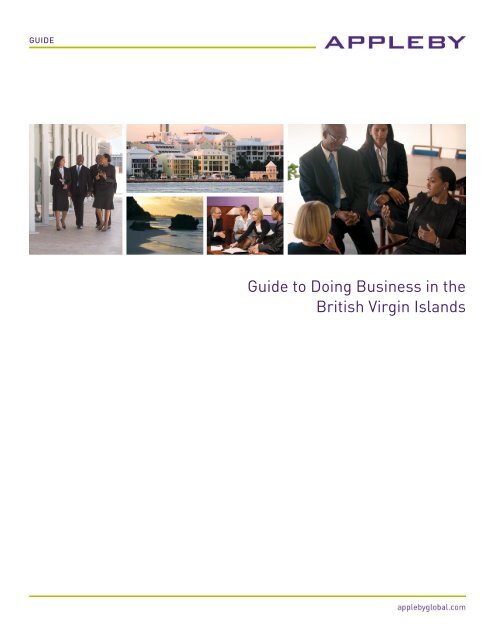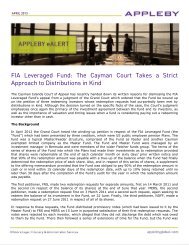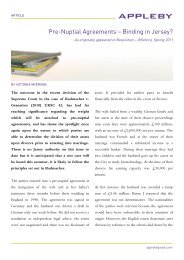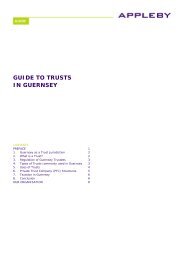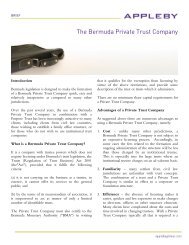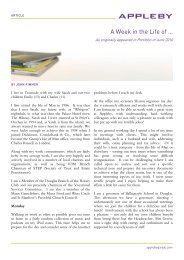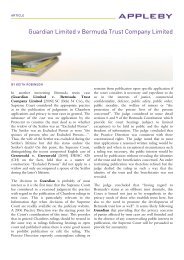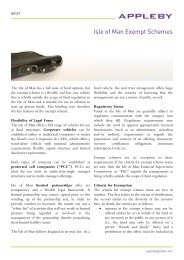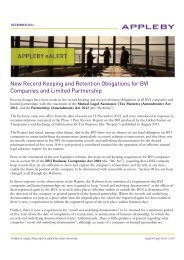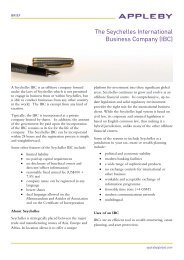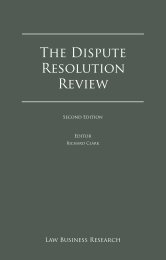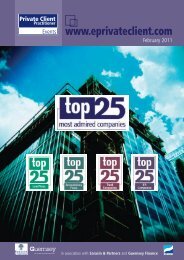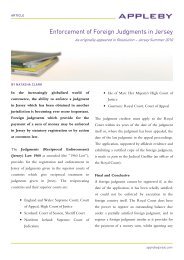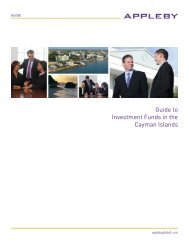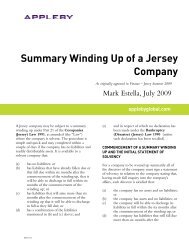Title Line 1 - Appleby
Title Line 1 - Appleby
Title Line 1 - Appleby
Create successful ePaper yourself
Turn your PDF publications into a flip-book with our unique Google optimized e-Paper software.
GUIDE<br />
Guide to Doing Business in the<br />
British Virgin Islands
1<br />
TABLE OF CONTENTS<br />
PREFACE ..........................................................................................................2<br />
1. Introduction ..................................................................................................3<br />
2. Incorporation or Registration......................................................................3<br />
3. Professional or Trade Licence ....................................................................4<br />
4. Immigration, Employment and Associated Issues.....................................5<br />
5. Taxation and Social Security........................................................................8<br />
6. Real Property Issues....................................................................................8
PREFACE<br />
The purpose of this Guide is to assist the reader in making a decision to establish an independent and physical<br />
office of a business in the British Virgin Islands (“BVI”) by providing pertinent BVI legal advice.<br />
The Guide does not address the position of “Belongers” 1 to the BVI looking to set up an independent and<br />
physical office in the Territory. Further, this Guide does not deal with certain regulated businesses operating in<br />
the BVI (e.g. trust companies, banks, insurance businesses, persons carrying on investment business, funds) which<br />
are subject to additional requirements, including initial approval by the BVI Financial Services Commission<br />
(“FSC”).<br />
This Guide is not a legal opinion and only contains general legal advice in relation to particular matters of BVI<br />
law, including immigration, employment and taxation. In each case, our commentary is provided with a view to<br />
assisting a business in reaching a decision on establishing a physical presence in the BVI. The Guide only<br />
highlights those issues which we considered to be material in the context of the decision and is not a complete<br />
analysis or summary of all applicable laws or regulations.<br />
2<br />
<strong>Appleby</strong><br />
Road Town, Tortola, BVI<br />
October 2010<br />
1 Under section 2(2) of the BVI Constitution Order 2007, a person belongs to the BVI if that person—<br />
(a) is born in the BVI and at the time of the birth his or her father or mother is or was—<br />
(i) a British overseas territories citizen (or a British Dependent Territories citizen) by virtue of birth, registration or<br />
naturalisation in the BVI or by virtue of descent from a father or mother who was born in the BVI; or<br />
(ii) settled in the BVI; and for this purpose “settled” means ordinarily resident in the BVI without being subject under the law in<br />
force in the BVI to any restriction on the period for which he or she may remain, but does not include persons on contract with the<br />
Government of the BVI or any statutory body or Crown corporation;<br />
(b) is born in the BVI of a father or mother who belongs to the BVI by birth or descent or who, if deceased, would, if alive, so<br />
belong to the BVI;<br />
(c) is a child adopted in the BVI by a person who belongs to the BVI by birth or descent;<br />
(d) is born outside the BVI of a father or mother who is a British overseas territories citizen by virtue of birth in the BVI or descent<br />
from a father or mother who was born in the BVI or who belongs to the BVI by virtue of birth in the BVI or descent from a father or<br />
mother who was born in the BVI;<br />
(e) is a British overseas territories citizen by virtue of registration in the BVI;<br />
(f) is a person to whom a certificate has been granted under section 16 of the Immigration and Passport Act 1977 of the BVI<br />
(basically meaning someone who has resided in the BVI who has resided in the BVI continuously for at least the last seven years) and<br />
has not been revoked under section 17 of the Act; and (without prejudice to the right of any person to apply for the grant of such a<br />
certificate under the Act) a British overseas territories citizen by virtue of naturalisation in the BVI has a right by virtue of this<br />
Constitution to apply for the grant of such a certificate;<br />
(g) is the spouse of a person who belongs to the BVI and has been granted a certificate under section 16 of the Act; or<br />
(h) was immediately before the commencement of the Constitution deemed to belong to the BVI by virtue of the Virgin Islands<br />
(Constitution) Order 1976(1[c]).
1. INTRODUCTION<br />
Other than a registered office for service of process, there is no requirement that a company registered in the BVI<br />
establish its own physical office in the BVI.<br />
However, a number of companies either registered in or outside the BVI have indeed established a physical<br />
business office in the BVI for various reasons. In part this may have been done in order to further strengthen the<br />
company’s independence and separate legal identity, or to confirm that the central management and control of<br />
the company actually resides in the BVI, or indeed simply to conduct business within the BVI.<br />
2. INCORPORATION OR REGISTRATION<br />
Usually a person or entity seeking to establish a business office in the BVI will incorporate a BVI company<br />
pursuant to the BVI Business Companies Act 2004 (the “Business Companies Act”), and this company will be<br />
the legal person that will conduct business in the Territory.<br />
A BVI company must have a registered agent and registered office in the BVI. <strong>Appleby</strong>’s affiliate, <strong>Appleby</strong><br />
Corporate Services (BVI) Limited, can assist with the application to incorporate a BVI company, and can also<br />
provide registered agent and registered office services. Further information on incorporating a BVI company is<br />
set out in <strong>Appleby</strong>’s “Guide to Companies in the British Virgin Islands”, available from our website<br />
(www.applebyglobal.com). There is an annual government licence fee of US$350 for a company with less up to<br />
50,000 shares, and US$1,100 for a company with more than 50,000 shares.<br />
In some circumstances, however, a company incorporated outside of the BVI may choose to do business in the<br />
BVI without establishing a BVI company for this purpose. Under the Business Companies Act, such a company<br />
is referred to as a “foreign company” and may only “carry on business” in the BVI if it has first obtained the<br />
permission of the Registrar of Companies (the “Registrar”) in the BVI. Once permission is granted by the<br />
Registrar, the foreign company’s details are included in the BVI Register of Foreign Companies.<br />
The Business Companies Act deems that a foreign company is not “carrying on business” in the BVI, and<br />
therefore does not require the permission of the Registrar, solely by reason of the fact that in the BVI, the<br />
company is or becomes party to legal proceedings (or settles a legal proceeding or dispute); holds a directors’ or<br />
members’ meeting or carries on any other activity concerning its internal affairs; opens a bank account; sells a<br />
property by way of an independent contractor; solicits or procures an order that becomes a binding contract, but<br />
only if the order is accepted outside the BVI; invests any of its funds or holds property; secures or collects any of<br />
its debts or enforces any security rights in relation to these debts; creates evidence of a debt, or creates a charge<br />
on property, or conducts an “isolated transaction” that is completed within a period of 31 days, meaning it is not<br />
one of a number of similar transactions repeated from time to time.<br />
Under the Business Companies Act, an application for registration as a foreign company needs to be made to the<br />
Registrar in a form that is approved by the Registrar, and needs to be accompanied by evidence of its<br />
incorporation; a certified copy of its constitution or similar document(s); a list of the company’s directors at the<br />
date of application (providing their full name, nationality, address and date of appointment), and a notice<br />
providing the name of the person appointed as the foreign company’s registered agent in the BVI (with this<br />
notice endorsed by the registered agent confirming their agreement to act).<br />
A foreign company that carries on business in the BVI (as defined in the Business Companies Act) without being<br />
registered commits an offence and is liable upon conviction to a fine of US$10,000.<br />
3
The Business Companies Act also requires that a registered foreign company file annual returns. A registered<br />
foreign company must file, on or before 31 March each year, an annual return that is made up to 31 December<br />
of the previous year. The annual return must be certified as correct by a director of the foreign company or by its<br />
registered agent.<br />
If a foreign company ceases to carry on business in the BVI, it must file a notice in the approved form with the<br />
Registrar within seven days of it ceasing business.<br />
The fee to register as, and the annual licence fee for, a foreign company under the Business Companies Act is<br />
US$300.<br />
3. PROFESSIONAL OR TRADE LICENCE<br />
In order to conduct business in the BVI, all persons and companies must obtain a trade licence, pursuant to the<br />
Business, Professions and Trade Licences Act 1989 (the “Act”). Given the time that it can take to obtain a trade<br />
licence, applying for this licence should be the first step taken to establish a physical office in the BVI (in<br />
conjunction with the application for a Non-Belongers Land Holding Licence mentioned below, if applicable).<br />
A trade licence is obtained by first completing and submitting in duplicate a Trade Licence Application Form<br />
(“Application Form”), which is available from (and is to be submitted to) the Trade and Investment Promotion<br />
Department (“Department”), within the Office of the Premier. A cover letter and supporting documents are<br />
required to accompany the Application Form. In terms of supporting documents, if the applicant is a company<br />
(the application procedure is different depending on whether the applicant is an individual or company), the<br />
Application Form must be accompanied by:<br />
• An outline of the operation and activities of the company;<br />
• A copy of the company’s certificate of incorporation;<br />
• A copy of the company’s Memorandum and Articles of Association;<br />
• Details of the company’s shareholdings;<br />
• Register of directors (the applicant must provide for each director, a 2 x 2 passport sized photo, personal<br />
reference, business reference, financial reference (in relation to an account maintained for not less than three<br />
years), a police record or clearance certificate (from a jurisdiction where the director has resided for not less<br />
than 12 months), copy of the picture page of passport, along with general information on work history,<br />
qualifications and experience); and<br />
• For BVI owned companies, documentation to prove that at least 60% of the shareholders and at least 60% of<br />
the directors are Belongers.<br />
Each of the above documents must either be submitted in original form, or as duplicate copies certified by either<br />
a notary public or justice of the peace from within the BVI.<br />
In granting a trade licence, the Department can impose one or more conditions upon the licence, including a<br />
licence for professional or vocational services. For example, the business premises of a restaurant will typically<br />
need to be inspected before a licence can be issued or, if issued, before the business can commence operation.<br />
4
There is currently no application fee for a trade licence but a fee is payable when the licence is issued. Schedule 1<br />
of the Act sets out the fees for a trade licence, which differ for Belongers and Non-Belongers and for the class of<br />
business. Annual fees are typically between US$350 and $600 (the licence to operate a professional services firm,<br />
such as an accounting or law firm, is typically US$600).<br />
A trade licence is granted for one year, and must be renewed annually at the end of each calendar year (each<br />
licence expires on 31 December, including in the first year of business). In respect of a licence issued after 31<br />
March in any year, the Act states that the licensee shall pay the proportionate amount of the annual fee for the<br />
remaining quarter of the year, and for the purpose of computing the proportionate amount every portion of a<br />
quarter of the year shall be computed as a full quarter.<br />
4. IMMIGRATION, EMPLOYMENT AND ASSOCIATED ISSUES<br />
5<br />
Work Permits<br />
Under the BVI Labour Code 2010 (the “Labour Code”), employers in the BVI are prohibited from<br />
employing expatriates where there is a suitably qualified local person, a Belonger, or the holder of a<br />
certificate of residency available to fill the position.<br />
A work permit must be obtained by any expatriate who wishes to engage in employment in the BVI,<br />
whether it is paid or unpaid, full-time or part-time. Employers must advertise any position in a local<br />
newspaper in the BVI for three consecutive weeks, and preference must be given to any Belonger who<br />
has applied and is qualified for the position.<br />
Before the employment of an expatriate will be permitted, that individual’s qualifications and experience<br />
must be proven to be necessary and sufficient for the position to be filled. Also, it must be proven that<br />
there is no Belonger who is able and available to fill that position. Work permits are obtainable for oneyear<br />
periods and employees on work permits are generally prohibited from working for other employers.<br />
An application for a new work permit in the BVI is filed with the Labour Department by the prospective<br />
employer on behalf of the expatriate seeking employment in the BVI. The application must include the<br />
following information in relation to the particular applicant:<br />
• country of origin;<br />
• training and experience;<br />
• number, date and place of issue of passport;<br />
• date of arrival in the BVI;<br />
• period of stay granted by Immigration Authorities;<br />
• intended employer;<br />
• salary or wage; and<br />
• business, trade, occupation or profession.<br />
The following documents are required to be submitted in support of the application:<br />
1) one copy of the newspaper advertisement for the position;
6<br />
2) statement signed by the employer, or his representative, as to whether there were Belonger applicants<br />
and, if so, the reason why none was offered employment;<br />
3) copy of the letter to each unsuccessful Belonger applicant, if applicable;<br />
4) two recent full-faced passport size photographs of the applicant;<br />
5) copies of the applicant's qualifications, resume, and letters of reference;<br />
6) a copy of the work contract, or the completed "Notice of Employment and Statement of Working<br />
Conditions" form provided by the Department of Labour, signed by the applicant and employer;<br />
7) one professional reference; and<br />
8) the completed work permit application form signed by both the employer and the employee.<br />
The Minister of Labour and Natural Resources may prescribe different fees for different persons or<br />
categories of persons and for persons receiving different wages or salaries. The application process<br />
generally takes 8-12 weeks. Once a work permit is granted, the Labour Commissioner prepares a work<br />
permit clearance letter which is then submitted to the Immigration Department.<br />
The Chief Immigration Officer will then review the work permit application to ensure that the applicant<br />
meets the Immigration Department’s requirements for an entry permit. If approved by the Officer, the<br />
work permit clearance letter is stamped and sent to the applicant along with an attached medical form. If<br />
the applicant is in the BVI, they must leave at this time, and upon return (or arrival for the first time for<br />
someone coming in from outside the BVI), s/he must present the stamped work permit clearance letter,<br />
the completed medical form, along with any other information requested by the Immigration<br />
Department to the Immigration Officer at the port of entry in the BVI. The applicant is then given a<br />
period of time to complete the process with the Labour and Immigration Departments.<br />
Renewal of Work Permit<br />
A work permit may be granted for a period not exceeding 3 years at a time. However, at this time, the<br />
category of workers that are entitled to apply for the 3-year permits has not yet been determined.<br />
Accordingly, it is expected that permits will continue to only be issued for up to one year at a time for<br />
the time being.<br />
A work permit renewal application must be submitted four to six weeks prior to expiration of the current<br />
work permit. If the applicant has more than one work permit, i.e. in the case of a part-time employee,<br />
the permits should be renewed at the same time. The following documents are required to be submitted<br />
when applying for a work permit renewal:<br />
1) the completed application for renewal of work permit signed by both the employer and the<br />
employee;<br />
2) the applicant’s work permit card (no photos are necessary unless the card needs to be changed); and<br />
3) a copy of the trade licence (if the applicant is self employed).<br />
Employment Contract and Issues<br />
In establishing a physical office in the BVI, and employing people to work within that office, it is<br />
important to note that the business will be subject to the general labour law requirements of the BVI set<br />
down in the Labour Code. These requirements need to be taken into account when negotiating and<br />
drafting employment contracts with persons to be employed in the BVI.
7<br />
i. Formalities<br />
Every employer in the BVI is required to provide employees with a written statement setting<br />
forth the employee’s working conditions which includes:<br />
1. the general responsibilities and related duties for which the employee is being hired;<br />
2. the regular hours of work and rest periods;<br />
3. the starting salary;<br />
4. the term of employment if other than indefinite;<br />
5. the probationary period (if any); and<br />
6. the employee’s leave and vacation privileges.<br />
ii. Probationary Period<br />
A new employee’s probationary period may not exceed 4 months unless the employee has the<br />
rank of supervisor or above, in which case the probationary period may not exceed 6 months.<br />
iii. Minimum Wage<br />
The minimum basic wage payable for employment in the BVI is US$4.00 per hour. The<br />
minimum wage payable to students enrolled in secondary school is US$3.00 per hour.<br />
iv. Sick Leave<br />
An employee (who has been employed for a continuous period of not less than four months), is<br />
entitled to a minimum of at least 12 sick days per year, during which an employee would receive<br />
the same basic wage or salary as if they had worked those days. However, any social security<br />
benefits received by the employee for illness or other physical incapacitation for work for those<br />
days may be deducted from the basic wage payable to the employee by the employer.<br />
v. Vacation<br />
Employers must grant employees with less than ten years of service at least one vacation day per<br />
month (after they have successfully passed their probationary period, if any) during which an<br />
employee would receive the same basic wage or salary as if they had worked that day. Such<br />
vacation leave is in addition to, and does not include, any public holiday or sick leave. An<br />
agreement between an employer and an employee by which the employee would forego the<br />
taking of earned vacation leave is not to be deemed to deny the employee the right to vacation<br />
leave at a future time to be mutually agreed between the employer and the employee. Any<br />
employee whose employment is terminated for any reason shall receive in respect of every day of<br />
vacation leave due to them the remuneration for each such day.<br />
vi. Public Holidays<br />
Where an employee does not work on a public holiday, employees are to be paid the basic wage<br />
they would have received for work performed on that day had it not been a public holiday<br />
provided that the employee worked their scheduled workday immediately before and after the<br />
public holiday and the public holiday did not fall on one of the employee’s scheduled workdays.
8<br />
In the event that an employer causes an employee to work on a public holiday, the employer is<br />
required to pay to the employee an hourly wage of at least one and one half times the employee’s<br />
basic rate for each hour worked on that day.<br />
5. TAXATION AND SOCIAL SECURITY<br />
There is no income tax in the BVI. Furthermore, there are no capital gains, capital transfer, inheritance or estate<br />
tax or death duties.<br />
The principal taxes that apply to businesses and their employees in the BVI are payroll tax and a social security<br />
levy. This is in addition to the stamp duty applied when transferring real property and other dispositions in the<br />
BVI, discussed in Part 6 below.<br />
i. Payroll Tax<br />
In the BVI, payroll tax is payable in respect of earned income from employment and the total payroll taxtake<br />
is shared between the employee and the employer. An employee is generally liable to tax of up to<br />
8% of his remuneration with the employer being subject to up to 6% of such remuneration.<br />
ii. Social Security<br />
(a) Registration<br />
Businesses in the BVI must arrange for all of their employees between the ages of 15 and 65 years<br />
to register with the Social Security Board and obtain a BVI Social Security card regardless of<br />
whether the employee is a Belonger or expatriate or whether the person is under a contract of<br />
service or is self-employed.<br />
(b) Contribution<br />
Social Security is a compulsory insurance plan to which employers, employees and self-employed<br />
individuals must contribute and is designed to protect insured persons from financial distress by<br />
providing partial income replacement when particular contingencies arise. Sickness, maternity,<br />
invalidity, age, funeral grant, survivor and employment injury benefits are available to qualified<br />
persons. If an employee receives social security benefits for illness or other physical incapacitation,<br />
those payments may subsequently be deducted from the wages to be paid by the employer to the<br />
employee.<br />
Contributions for employees in the private sector and self-employed persons amount to 8½<br />
percent of insurable earnings. Employees contribute 4 percent of that total and 4½ percent is<br />
contributed by the employer. Civil servants contribute 7½ percent with 3½ percent paid by the<br />
employee and 4 percent by Government. Social Security contributions can also be voluntary for<br />
persons who have worked in the BVI and are living abroad or for persons who no longer work<br />
but have not reached the eligible age of 65 to collect benefits.<br />
6. REAL PROPERTY ISSUES<br />
In order for a non-Belonger company to purchase land in the BVI for the purpose of conducting business it is<br />
necessary to obtain a Non-Belonger Land Holding Licence. An application for a Non-Belonger Land Holding<br />
Licence is made under the Non-Belongers Land Holding Regulation Act (Cap. 122) (the “Land Holding Act”),
and needs to be approved by the Executive Council (the Cabinet) of the BVI Government. Under the Land<br />
Holding Act, a non-Belonger Company is defined as a company, whether incorporated in or outside the BVI, in<br />
which any one of its directors is a non-Belonger or where any of the company’s non-Belonger shareholders own<br />
more than one-third of its shares (“Non-Belonger Company”). 2<br />
If a Non-Belonger Company is renting office space in the BVI on an annual tenancy basis, a licence is not<br />
required. According to current practice, a licence is not required even if there is an option to renew the tenancy.<br />
If, however, a non-Belonger is leasing a commercial property in the BVI, and that specific property (e.g.<br />
area/floor of a commercial building) is not defined in the Land Register of the BVI (meaning that the specific<br />
property has not been registered and assigned a specific Block and Parcel in the Land Register), the current<br />
practice seems to be that the Ministry (Ministry of Natural Resources and Labour) does not require the applicant<br />
to hold a licence, even when the lease is not an annual tenancy. It is still advisable, however, to apply for the<br />
licence in case of a change of policy by the Ministry.<br />
As a matter of practice, it is advisable to submit the application for a Non-Belonger Land Holding Licence and<br />
Trade Licence at the same time since if the Non-Belonger Land Holding Licence is granted, the Trade Licence<br />
will be automatically granted.<br />
An application for a Non-Belonger Land Holding Licence is to be submitted to the BVI Ministry of Natural<br />
Resources and Labour, and is to be accompanied by a US$500.00 application fee for companies. Once the<br />
licence is approved, a further US$1,000.00 is to be paid upon collection of the licence.<br />
If the application is to purchase property, then the property needs to be advertised for four consecutive weeks<br />
prior to submission of the licence application, in order to provide Belongers with an opportunity to purchase the<br />
property.<br />
2 Section 6 of the Land Holding Act goes somewhat further than this, by providing that a company is a “non-belonger company”:<br />
9<br />
(a) if any of its directors is an unlicensed non-belonger,<br />
(b) if more than one-third of the votes exercisable at any meeting of<br />
the company or which would be exercisable if a meeting of the<br />
company was held are vested in unlicensed non-belongers, or<br />
(c) in the case of a company having a share capital, if more than onethird<br />
of the nominal amount of its issued shares are held by<br />
unlicensed non-belongers, or<br />
(d) in the case of a company not having a share capital, if more than<br />
one-third in number of its members are unlicensed non-belongers,<br />
or<br />
(e) if the amount paid or payable in any period of twelve months as<br />
dividends to those members of the company who are unlicensed<br />
non-belongers exceeds one-third of the total amount paid or<br />
payable by the company as dividends in the same period, or<br />
(f) if more than one-third of the nominal value of the outstanding<br />
debentures of the company are held by unlicensed non-belongers,<br />
or<br />
(g) if the annual interest on the debentures of the company for the<br />
time being held by unlicensed non-belongers exceeds one-third of<br />
the annual interest on all the debentures of the company for the<br />
time being outstanding.
The application for a licence must be accompanied by:<br />
(a) two character references for each shareholder and director;<br />
(b) two financial references from the applicant’s bank, employer or accountant, which must indicate that the<br />
applicant is able to purchase and develop the property (if that is why the licence is required);<br />
(c) a police certificate evidencing that each director and shareholder is/are of good standing;<br />
(d) a passport sized photo of each director and shareholder;<br />
(e) four consecutive newspaper advertisements for the property;<br />
(f) a letter sized cadastral survey showing the land and surrounding properties;<br />
(g) a valuation report form a licensed surveyor; and<br />
(h) additional supporting documentation (including a copy of the relevant Agreement of Sale, and copy of the<br />
company’s Memorandum and Articles of Association, Certificate of Incorporation, current Certificate of<br />
Good Standing and register of members or a Certificate of Incumbency from the Company’s Registered<br />
Agent).<br />
The usual (and recommended) process is for a lawyer qualified in the BVI to be engaged to prepare and submit<br />
the application, and then deal with the Ministry during the consideration of the application.<br />
Applications typically take between three and eight months to process. If an application is granted, the successful<br />
applicant needs to provide the Ministry with a registered copy of the licence and the registered instrument of the<br />
land transfer within three months of the date of the licence, for record keeping.<br />
It is important to note that stamp duty also needs to be paid by the purchaser of land in the BVI before a transfer<br />
can be registered. The present rate is 12% of the consideration or the market value of the property, whichever is<br />
higher. In relation to a lease, the stamp duty payable for a term of 20 years or more is 1.5% of the total of rent<br />
payable for 20 years and other money consideration, however described, to be paid under the lease. For a lease<br />
with a term of less than 20 years, the stamp duty is 1.5% of the total rent payable for the period and other money<br />
consideration, however described, to be paid under the lease.<br />
If property in the BVI is being purchased with a view to developing it, the Non-Belonger Company is typically<br />
required to enter into a financial commitment to develop the land. The commitment period will usually be three<br />
years or less. The development commitment is calculated by the government based on environment and<br />
planning considerations, and will usually not be less than US$250,000.00. Where the owner does not honour the<br />
development commitment, the government is entitled to fine the buyer up to 40% of the sales price.<br />
Additionally, the owner is only allowed to sell the property once the development commitment has been<br />
completed.<br />
10
For the purposes of assistance in any aspect of the establishment of an office in the BVI please feel free to contact<br />
one of the designated partners below.<br />
11<br />
Michael Burns<br />
Managing Partner – BVI<br />
+1 284 852 5318<br />
mburns@applebyglobal.com<br />
Sally Cox<br />
Partner – BVI<br />
+1 284 852 5301<br />
scox@applebyglobal.com<br />
Valerie Georges-Thomas<br />
Partner – BVI<br />
+1 284 852 5306<br />
vthomas@applebyglobal.com
<strong>Appleby</strong> is the leading provider of offshore legal, fiduciary and administration services. With an unparalleled<br />
presence in the key offshore jurisdictions of Bermuda, the British Virgin Islands, the Cayman Islands, Isle of<br />
Man, Jersey, Mauritius and the Seychelles, the group offers advice on offshore law. We also have offices in the<br />
international financial centres of London, Hong Kong, Zurich and Bahrain.<br />
Over 800 lawyers and professional specialists deliver sophisticated, specialised services, primarily in the areas of<br />
Corporate and Commercial; Litigation and Insolvency; Private Client and Trusts; and Property. We advise<br />
global public and private companies, financial institutions, and high net worth individuals, working with them<br />
and their advisers to achieve practical solutions, whether in a single location or across multiple jurisdictions.<br />
This publication is intended only to provide a summary of the subject mattered covered. It does not purport to<br />
be comprehensive or to provide legal advice. No person should act in reliance on any statement contained in<br />
this publication without first obtaining specific professional advice.<br />
If this guide has been sent to you, and you would like to update your details or be removed from our marketing<br />
database, please contact the marketing department at <strong>Appleby</strong> or e-mail info@applebyglobal.com.<br />
12
Bahrain<br />
Bermuda<br />
British Virgin Islands<br />
Cayman Islands<br />
Guernsey<br />
Hong Kong<br />
Isle of Man<br />
Jersey<br />
London<br />
Mauritius<br />
Seychelles<br />
Zurich


